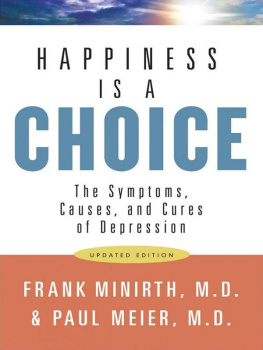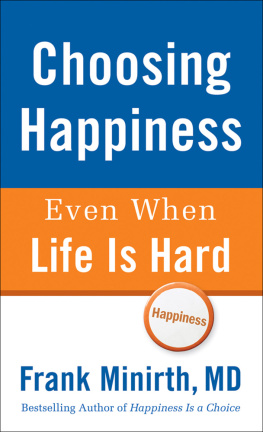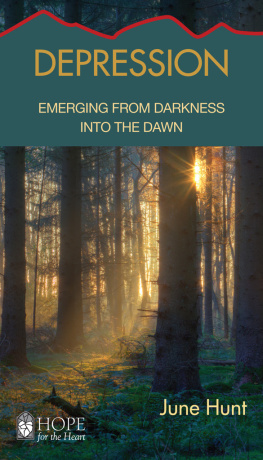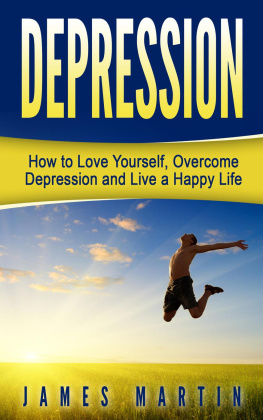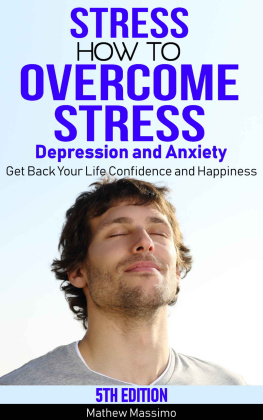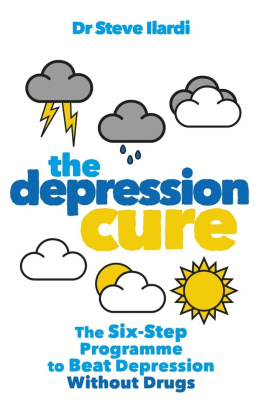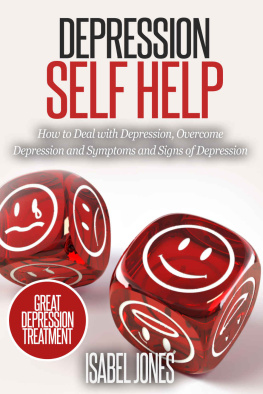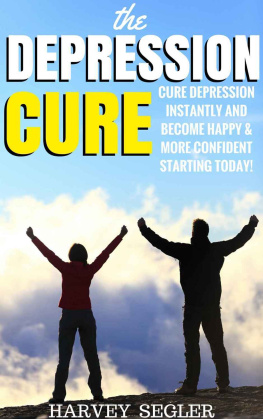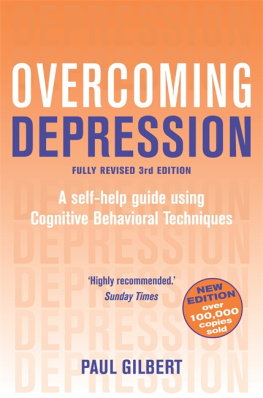Happiness
Is a Choice
Happiness
Is a Choice
The Symptoms, Causes,
and Cures of Depression
Frank Minirth, M.D.,
and Paul Meier, M.D.

1978, 1994, 2007 by Frank B. Minirth and Paul D. Meier
Published by Baker Books
a division of Baker Publishing Group
P.O. Box 6287, Grand Rapids, MI 49516-6287
www.bakerbooks.com
Printed in the United States of America
All rights reserved. No part of this publication may be reproduced, stored in a retrieval system, or transmitted in any form or by any meansfor example, electronic, photocopy, recordingwithout the prior written permission of the publisher. The only exception is brief quotations in printed reviews.
Library of Congress Cataloging-in-Publication Data
Minirth, Frank B.
Happiness is a choice : the symptoms, causes, and cures of depression / Frank Minirth and Paul Meier. Updated ed.
p. cm.
Includes bibliographical references.
ISBN 10: 0-8010-6826-6 (pbk.)
ISBN 978-0-8010-6826-3 (pbk.)
1. Depression, MentalPopular works. I. Meier, Paul D. II. Title.
RC537.M55 2007
616.8527dc22
2007000677
Unless otherwise indicated, Scripture is taken from the King James Version of the Bible.
Scripture marked NASB is taken from the New American Standard Bible, Copyright 1960, 1962, 1963, 1968, 1971, 1972, 1973, 1975, 1977, 1995 by The Lockman Foundation. Used by permission.
Scripture marked NIV is taken from the HOLY BIBLE, NEW INTERNATIONAL VERSION. NIV. Copyright 1973, 1978, 1984 by International Bible Society. Used by permission of Zondervan. All rights reserved.
Scripture marked NKJV is taken from the New King James Version. Copyright 1982 by Thomas Nelson, Inc. Used by permission. All rights reserved.
To our wives
Mary Alice Minirth
and
Jan Meier
who make happiness
a much easier choice
and to
our parents
who nourished us
in love, discipline,
and Christian principles
Contents
We wish to thank Betsy Webb for her help in the 1994 revision of this book. We also wish to thank those who helped us prepare the original 1978 version and the revised version of Happiness Is a Choice: Nancy Brown, Sally Brantmeier, Mary Ann Johnson, Bettye Laesch, Carol Mandt, and Jeanne Ryan.
I often recall a colleague, an eminent and very well-known psychiatrist, who entrusted his daughter to my care after she had attempted suicide. In a letter to me, my colleague wrote that he was not a believer, but his daughter was, and that he thought a believer like me was best equipped to help her resolve her difficulties.
My colleague was much more of an expert than I, who am only a simple general practitioner. In a way, then, this was a matter of an act of faith regarding faith. Thus, even an unbelieving doctor may consider faith to be a factor in recovery.
How does it happen that there are so many depressed individuals among the most fervent believers? And also, how does it happen that so often their faith, which (as my colleague thought) could be a factor in recovery, appears to further complicate their case, because they reproach themselves for their depression, as if it were a matter of lack of faith?
We see how these relationships between spiritual life and psychological health are subtle and delicate. They must be envisioned in their complexity. We must take account of the importance both of religious life and of the pathological phenomena which science studies.
Too often there is a tendency to place faith and science in opposition to each other instead of joining them. Some misjudge the role of faith in destiny, and others misjudge the role of maladies which strike believers as well as unbelievers and which science discloses. The sick and the healthy need to be enlightened on this double aspect of life.
It is the merit of this book by my two American colleagues that they have dealt with this double aspect of life in a manner so serious and clear that it is accessible to everyone. Here is a book which will help all depressed individuals to better understand themselves and thus to contribute to their own recovery. But this book will also help those who are healthy to better understand the depressed, who so often have the feeling of being misunderstood or misjudged by those who are healthy. This will in turn be favorable to the recovery of the depressed.
Anyone who reads this book will gain a better knowledge of the laws of life which are divine, so that he may better conform to those laws.
What is it that science studies, if not the laws of nature, the laws established by the Creator over His creation? And the first law of God is love! Like the authors of this book, I hope that every reader finds in these pages an opportunity to approach both God and good health.
Geneva, June 23,
1978 Paul Tournier
For further information regarding the nationwide services of the Minirth Clinic, please call 1-888-646-4784.
To reach the Meier Clinic nearest you, please call 1-888-7-CLINIC or you may reach us at www.meierclinics.com.
I would like to initiate the reader on his or her journey through this book by breaking tradition and sharing some of my personal, innermost reflections. As I write this I am sitting calmly in a waiting area at the Dallas/Fort Worth Airport. As I gaze out the windows I see the large cumulus clouds gently floating by as the airplanes mechanically come and go. I feel an inner joy and excitement. I feel at peace with God, at peace with my wife and children, and at peace with the friends I love so dearly. And yet, as I am looking around this waiting area and analyzing (as we psychiatrists love to do) the people sitting around me, I have a somewhat different inner feeling. As I search for ways to describe it, I think of the word angsta term present-day German philosophers and theologians are tossing around. Angst is a type of undefinable inner anxiety. As I look around right now and think about the condition of my fellow man en masse, I feel angst. In my practice of psychiatry I counsel many individuals from that mass of humanity; I have come to understand the repressed fears, insecurities, and anger within many of them, sometimes even hidden behind smiling faces. I understand and I empathize. In fact, I not only empathize, I hurt for them deep within. I want them to know the things I have learned that have brought me great personal joy and inner peace. That is why Dr. Frank Minirth and I feel compelled to write this bookto share what we have learned with you, the reader, in hopes that you will in turn pass it on to others you love.
Many years ago I read a very thought-provoking statement made by Abraham Lincoln: Most people are about as happy as they choose to be. I couldnt agree with him more. Lincoln should know. He went through much anguish in his lifethe death of his fiance, lost elections, the Civil War, and other major disappointments. At one period of his life he was so depressed he considered suicide. But Lincoln chose to overcome his depression. He chose to be happy and obtained inner joy and peace in those last years before he fell victim to the bullet of a hostile fellow man.
Before you decide to agree or disagree with Lincolns assertion that most people are about as happy as they choose to be, or with the authors assertion that happiness is a choice, let me explain what the title we have selected means. My associate and I have a combined posthigh school education totaling over 30 years. During that time we thoroughly researched mans psychology, physiology, anatomy, mentality, and spirituality. We have also exercised our psychotherapeutic skills on thousands of patients. Both of us can say with a deep inner conviction that a majority of human beings do
Next page
